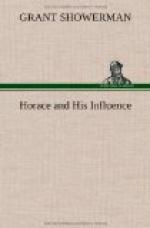ii. THE INTERPRETER OF ITALIAN LIVING
Again, in its visualization of the life of Italy, Horace’s art is no less clear than in the presentation of her scenery. Where else may be seen so many vivid incidental pictures of men at their daily occupations of work or play? In Satire and Epistle this is to be expected, though there are satirists and writers of letters who never transfer the colors of life to their canvas; but the lyrics, too, are kaleidoscopic with scenes from the daily round of human life. We are given fleeting but vivid glimpses into the career of merchant and sailor. We see the sportsman in chase of the boar, the rustic setting snares for the greedy thrush, the serenader under the casement, the plowman at his ingleside, the anxious mother at the window on the cliff, never taking her eyes from the curved shore, the husbandman passing industrious days on his own hillside, tilling his own acres with his own oxen, and training the vine to the unwedded tree, the young men of the hill-towns carrying bundles of fagots along rocky slopes, the rural holiday and its festivities, the sun-browned wife making ready the evening meal against the coming of the tired peasant. We are shown all the quaint and quiet life of the countryside.
The page is often golden with homely precept or tale of the sort which for all time has been natural to farmer folk. There is the story of the country mouse and the town mouse, the fox and the greedy weasel that ate until he could not pass through the crack by which he came, the rustic who sat and waited for the river to get by, the horse that called man to aid him against the stag, and received the bit forever. The most formal and dignified of the Odes are not without the mellow charm of Italian landscape and the genial warmth of Italian life. Even in the first six Odes of the third book, often called the Inaugural Odes, we get such glimpses as the vineyard and the hailstorm, the Campus Martius on election day, the soldier knowing no fear, cheerful amid hardships under the open sky, the restless Adriatic, the Bantine headlands and the low-lying Forentum of the poet’s infancy, the babe in the wood of Voltur, the Latin hill-towns, the craven soldier of Crassus, and the stern patriotism of Regulus. Without these the Inaugurals would be but barren and cold, to say nothing of the splendid outburst against the domestic degradation of the time, so full of color and heat and picturesqueness:
’T_was not the sons of parents such
as these_
T_hat tinged with Punic blood the rolling
seas_,
L_aid low the cruel Hannibal, and brought_
G_reat Pyrrhus and Antiochus to naught_;
B_ut the manly brood of rustic soldier
folk_,
T_aught, when the mother or the father
spoke_
T_he word austere, obediently to wield_
T_he heavy mattock in the Sabine field_,
O_r cut and bear home fagots from the
height_,
A_s mountain shadows deepened into night_,
A_nd the sun’s car, departing down
the west_,
B_rought to the wearied steer the friendly
rest_.




